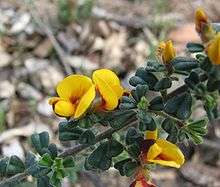Pultenaea scabra
| Rough bush-pea | |
|---|---|
 | |
| Scientific classification | |
| Kingdom: | Plantae |
| (unranked): | Angiosperms |
| (unranked): | Eudicots |
| (unranked): | Rosids |
| Order: | Fabales |
| Family: | Fabaceae |
| Genus: | Pultenaea |
| Species: | P. scabra |
| Binomial name | |
| Pultenaea scabra R.Br. | |
| Synonyms | |
|
Pultenaea scabra R.Br. var. scabra | |
Pultenaea scabra, the rough bush-pea, is a shrub which is endemic to Australia. It is a member of the family Fabaceae and of the genus Pultenaea.
The species is an erect or spreading shrub that can grow up to 3 metre in height. The leaves have a rough surface and recurved edges. They are variable in shape and their length ranges from 3 to 16 mm in length and 2 to 13 mm in width.[1]
The flowers, which appear in spring, are yellow with a red centre. The pods which follow are hairy with half their length concealed by the calyx [1]
The species was first formally described by botanist Robert Brown in 1811 in Hortus Kewensis.[2]
It occurs in South Australia, Victoria and New South Wales.[1]
References
- 1 2 3 Corrick, M.G. & Fuhrer, B.A. (2001). Wildflowers of Victoria and adjoining areas. Australia: Bloomings Books. ISBN 1876473142.
- ↑ "Pultenaea sericea". Australian Plant Name Index (APNI), IBIS database. Centre for Plant Biodiversity Research, Australian Government, Canberra. Retrieved 2008-09-02.